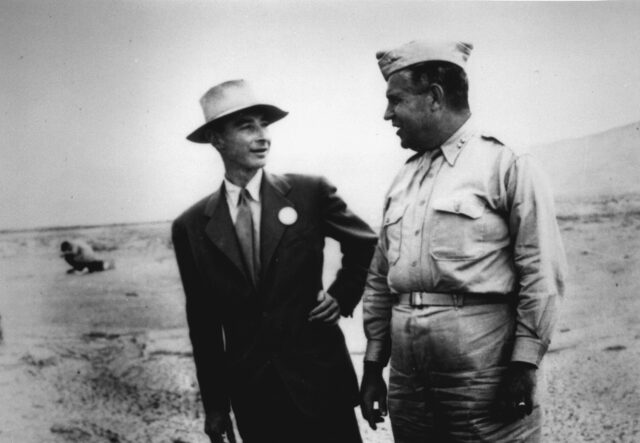
Mackubin Owens is a Senior Fellow at the Foreign Policy Research Institute and a Marine Corps Veteran. He writes and lectures widely on issues of military history and strategy. The article appeared in GoLocalProv in 2023 and we find his thoughts extremely relevant today.”
As we prepare to enter the month of August, we will, I’m sure, once again rehash the perennial debate concerning the morality of the use of the atom bomb against Japan. This year, the debate will be enlivened by the release of the excellent film, Oppenheimer, which deals with the Manhattan Project, the Trinity Test in Alamogordo, New Mexico, and with the genesis of many of the debates concerning nuclear weapons that shaped US national security during the Cold War.
Any debate over the use of the bomb against Hiroshima and Nagasaki on 6 and 9 August, 1945, must examine the alternative courses of action available to President Harry Truman. The two bombs killed between 129,000 and 226,000 people, most of whom were civilians. Such massive civilian casualties have led critics of the bombing to call it unnecessary and indeed, a war crime. But supporters of the decision to use the bombs have argued that such criticism ignores the likely human cost of the alternatives.
The Navy, already perceiving the challenge that airpower posed to sea power that would characterize the early years of the Cold War, argued for a complete naval blockade of Japan, the objective of which was to starve Japan into submission. Such a policy would have resulted in far more deaths among the Japanese than the bomb, and starving the population of a country is hardly a humanitarian argument.
The United States had developed a plan for the invasion of Japan. Code named Operation DOWNFALL, the plan had two parts: the invasion of the southernmost Japanese home island of Kyushu (Operation OLYMPIC) to begin in November of 1945; and the invasion of Honshu (Operation CORONET), in March of 1946. Operation DOWNFALL dwarfed D-D in magnitude. Operation NEPTUNE, the amphibious phase of Operation OVERLORD, the invasion of France, called for the initial commitment of six allied infantry divisions to land on five beaches on the Normandy coast while three airborne divisions dropped inland. Operation OLYMPIC (Kyushu) called for eleven infantry divisions and three Marine divisions; operation CORONET (Honshu) 20 infantry divisions and three Marine divisions. The geography of the two islands made it clear to the Japanese defenders where the landing would occur.
Estimates of allied casualties varied but were staggering. The fight facing the allies on the Japanese home islands was adumbrated by the vicious battle of Okinawa. Those who wish to get a sense of what an invasion of Japan would have entailed should watch the remarkable HBO series, The Pacific, especially its treatment of Okinawa. Japanese casualties most certainly would have exceeded those resulting from Hiroshima and Nagasaki. The allies were facing not only resistance from the Japanese army but also from a fanatical civilian population. There is a great deal of evidence that the atom bombings spared Japanese civilians.
It is, of course, easy to make moral judgments retrospectively, especially by people who face no threat of loss. But things looked different to those who would have paid the price. A case in point is the remarkable essay by Paul Fussell in the August, 1981 issue of The New Republic: “Thank God for the Atom Bomb.” The essay by Fussell, a university professor and literary/cultural historian best known for his book, The Great War and Modern Memory, shocked his liberal anti-nuclear colleagues (Ronald Reagan had just been elected in 1980 and was unleashing the policies that would help lead to the collapse of the Soviet Union and the end of the Cold War). But Fussell viewed the debate from the perspective of someone who would have actually invaded Japan. As an Army first lieutenant who had been wounded in the European Theater of Operation, his reward for beating the Nazis was to perhaps die on a Japanese beach.
As he wrote: “I want to consider something suggested by the long debate about the ethics, if any, of that ghastly affair. Namely, the importance of experience, sheer, vulgar experience, in influencing, if not determining, one’s views about that use of the atom bomb. The experience I’m talking about is having to come to grips, face to face, with an enemy who designs your death. The experience is common to those in the marines and the infantry and even the line navy, to those, in short, who fought the Second World War mindful always that their mission was, as they were repeatedly assured, ‘to close with the enemy and destroy him.’ Destroy, notice: not hurt, frighten, drive away, or capture. I think there’s something to be learned about that war, as well as about the tendency of historical memory unwittingly to resolve ambiguity and generally clean up the premises, by considering the way testimonies emanating from real war experience tend to complicate attitudes about the most cruel ending of that most cruel war.”
I know my father shared Fussell’s perspective. As a Marine, he had been wounded in 1943 on Bougainville in the Solomons. On convalescence leave, he had met and married my mother in 1944. He had rejoined the 3rd Marine Division and was scheduled to be in the assault wave on Kyushu, which was scheduled for November of 1945, the month I was born. Without the bomb, it is very likely I would never have met my father.
Accordingly, as we renew this annual debate, it is important that we take into account the perspective of those who made the decision to develop and then to use the bomb. Moralizing in the abstract is easy for people who have no skin in the game.

